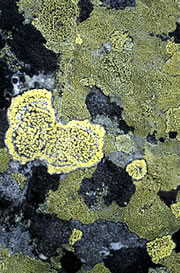Plants detonated Cambrian explosion
Global cooling may have allowed complex animals to
flourish.
1 October 2003
JOHN WHITFIELD
 |
| Early lichen-like plants could have increased
erosion. |
| © GettyImages |
|
|
The first land plants might have triggered a rush of animal evolution.
German researchers are proposing a controversial theory that the plants cooled
Earth, making it conducive to complex life1.
The idea is a new twist on the Gaia hypothesis that living things
influence the global environment. "During the evolution of the Earth there was
a decrease in temperature, and higher life forms have lower temperature
limits," says Werner von Bloh of the Potsdam Institute for Climate Impact
Research.
Many researchers think that rising, not falling, temperatures lit the
fuse for the Cambrian explosion, the biological Big Bang 540 million years ago
when most modern animal groups appear in the fossil record.
There is genetic evidence that simple plants, such as algae and lichens,
colonized the land 800 million years ago. But no plant fossils from this time
have been found.
It's also unclear whether there was a slump in temperatures, and whether
such a drop would have favoured complex life. Says palaeontologist Robert
Riding of Cardiff University, UK: "Nobody knows what's right or wrong, but it
sounds odd to me".
But the link between temperature and life deserves further
investigation, argues geochemist David Schwartzman of Howard University in
Washington DC. "The global emergence of certain types of organism could be tied
to their optimum temperature," he says.
Chalk it up
Land plants increased erosion, argue von Bloh and his colleagues.
Calcium in the newly exposed minerals reacted with carbon dioxide in the air to
make calcium carbonate, or limestone. Rivers washed this to the sea, sealing
the carbon in the ocean bed.
The loss of carbon dioxide weakened the greenhouse effect and cooled the
Earth. Once the temperature fell below a certain threshold, a runaway process
began, say von Bloh and his team. Once conditions became favourable for complex
life, these organisms cooled the Earth yet further, and so on.
In the space of about 40 million years, the researchers believe, global
temperatures dropped from an average of more than 30 ºC to less than 15 ºC.
Today, only bacteria are found in habitats hotter than about 60
?C.
Heated debate
"It's possible that some part of the temperature story is true," says
Tim Lenton of the Centre for Ecology and Hydrology in Edinburgh, UK. "The Earth
has a lot less carbon dioxide in its atmosphere now than before the Cambrian
explosion."
But Lenton thinks instead that increasing oxygen levels sparked the
Cambrian explosion. "I'm not convinced that excessive global warmth held back
evolution," he says, pointing out that organisms could still have evolved at
the planet's poles.
|
I'm not convinced that excessive warmth held back
evolution
|
|
Tim Lenton
Centre for Ecology and Hydrology,
Edinburgh
|
|
|
Ancient rocks seem to show that Earth went through a cold snap - perhaps
freezing over completely - between 500 million and 800 million years ago.
Riding reckons that the end of this period alone might have favoured the
emergence of animals.
"Everyone agrees that the Cambrian explosion was waiting to happen once
the right conditions came along," Riding says. "People argue over what those
conditions were."
|


